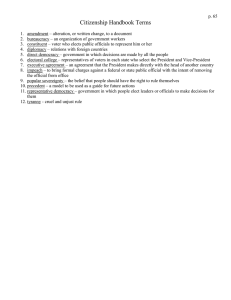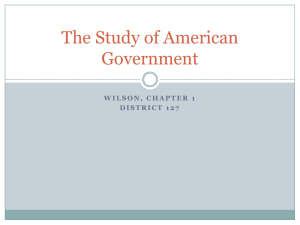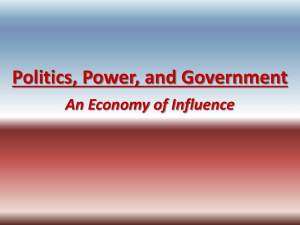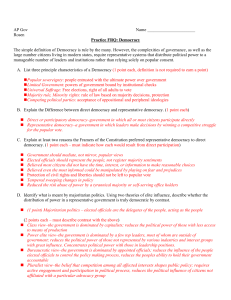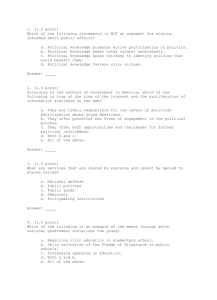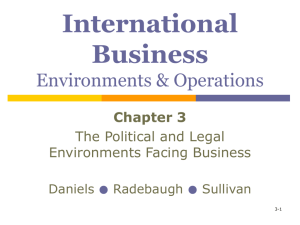Chapter One – The Study of American Government
advertisement
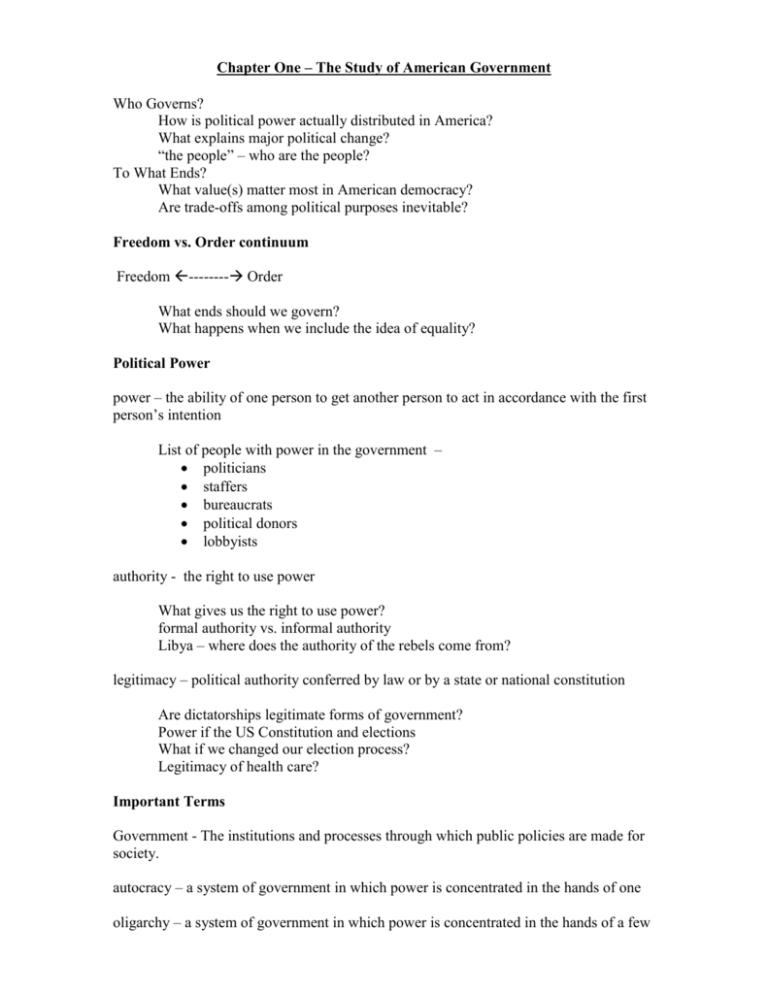
Chapter One – The Study of American Government Who Governs? How is political power actually distributed in America? What explains major political change? “the people” – who are the people? To What Ends? What value(s) matter most in American democracy? Are trade-offs among political purposes inevitable? Freedom vs. Order continuum Freedom -------- Order What ends should we govern? What happens when we include the idea of equality? Political Power power – the ability of one person to get another person to act in accordance with the first person’s intention List of people with power in the government – politicians staffers bureaucrats political donors lobbyists authority - the right to use power What gives us the right to use power? formal authority vs. informal authority Libya – where does the authority of the rebels come from? legitimacy – political authority conferred by law or by a state or national constitution Are dictatorships legitimate forms of government? Power if the US Constitution and elections What if we changed our election process? Legitimacy of health care? Important Terms Government - The institutions and processes through which public policies are made for society. autocracy – a system of government in which power is concentrated in the hands of one oligarchy – a system of government in which power is concentrated in the hands of a few Republican form of government Republic - translates from Latin res “thing” publica “public” or the public things or public affairs. a state in which the supreme power rests in the body of citizens entitled to vote and is exercised by representatives chosen directly or indirectly by them, not a monarchy only form of government named in the Constitution Democratic form of government Democracy - translates from Greek demos “people” kratia “rule” or the rule of the people. Democracy takes on two main forms, direct democracy and representative democracy Government should be a slow and deliberative process Direct democracy – a government in which all or most of the citizens participate directly found ineffective on the federal level – mob rule Can the uneducated make decisions about what is in the best interest of the country local affairs – town meetings, what conditions are needed to make such meetings successful Representative democracy – a government in which leaders make decisions by winning an election for the popular vote How should we choose our representatives? Does campaign financing impact the ability of our gov’t to be a true representative government demagogue – a politician who appeals to and often deceives the masses by manipulating their emotions and prejudices 94% of Americans in a 2004 survey regarded democracy as the “best form of government” Does voter turnout support that statistic? QuickTime™ and a decompressor are needed to see this picture. Distribution of Political Power Majoritarian – government officials following the “will of the people” – where does the danger in this lie? – government official should serve as mediators, balancing the will of the people and best interest of the country Elite – person with a disproportionate share of some valued resource, like money or political power -- Donald Trump, would he have a voice in this country if it not for his real estate success Four schools of thought on the power elite and power distribution: 1. Marxist View – government is dominated by capitalists a. German philosopher b. competition between the capitalists (bourgeoise) and the workers (proletariat) c. those who dominate the economy dominate the government d. subsidies to oil companies? 2. Power Elite View – government is dominated by a few top leaders, most of whom are outside of the government a. government is dominated by three groups – corporate leaders, top military leaders and a handful of elected officials b. C. Wright Mills (1959) - Waco, TX c. Modern theorists include the media, labor unions officials and heads of various special interests groups d. GE and WWII – Dwight Eisenhower’s farewell address the Military Industrial Complex / Haliburton and Iraq 3. Bureaucratic View – government is dominated by appointed officials a. Max Weber – German scholar and sociologist b. government is controlled by those responsible for the daily operations – not only implementing the public policy but shaping it to suit their own needs c. career government employees, lasting through various administrations – have power and connections due to their position in government d. Revolving door? 4. Pluralist View – belief that competition among all affected interests shapes public policy a. political resources – money, prestige, expertise, organizational position and mass media exposure – scattered and available so that no small group of elites can hold too much power – not suggesting equality to such resources b. So many layers of gov’t – fed, state, local and bureaucratic agencies within c. environmentalists vs. off shore drilling
